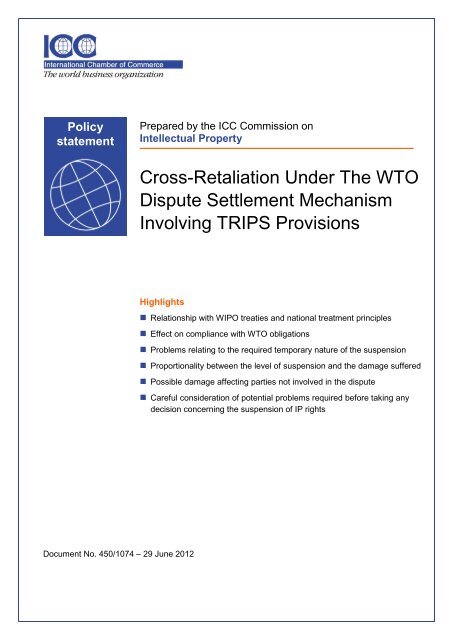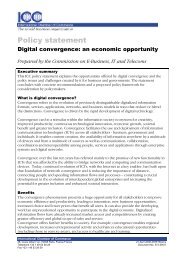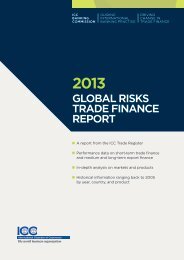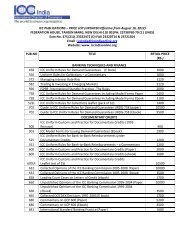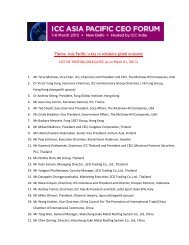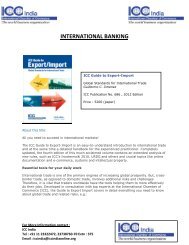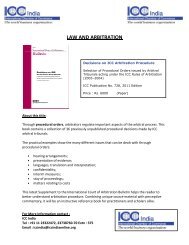Cross-Retaliation Under The WTO Dispute Settlement Mechanism ...
Cross-Retaliation Under The WTO Dispute Settlement Mechanism ...
Cross-Retaliation Under The WTO Dispute Settlement Mechanism ...
Create successful ePaper yourself
Turn your PDF publications into a flip-book with our unique Google optimized e-Paper software.
Policy<br />
statement<br />
Prepared by the ICC Commission on<br />
Intellectual Property<br />
<strong>Cross</strong>-<strong>Retaliation</strong> <strong>Under</strong> <strong>The</strong> <strong>WTO</strong><br />
<strong>Dispute</strong> <strong>Settlement</strong> <strong>Mechanism</strong><br />
Involving TRIPS Provisions<br />
Highlights<br />
• Relationship with WIPO treaties and national treatment principles<br />
• Effect on compliance with <strong>WTO</strong> obligations<br />
• Problems relating to the required temporary nature of the suspension<br />
• Proportionality between the level of suspension and the damage suffered<br />
• Possible damage affecting parties not involved in the dispute<br />
• Careful consideration of potential problems required before taking any<br />
decision concerning the suspension of IP rights<br />
Document No. 450/1074 – 29 June 2012
<strong>Cross</strong>-<strong>Retaliation</strong> <strong>Under</strong> <strong>The</strong> <strong>WTO</strong> <strong>Dispute</strong> <strong>Settlement</strong> <strong>Mechanism</strong> Involving TRIPS Provisions<br />
I. Background<br />
<strong>Under</strong> the World Trade Organization’s (<strong>WTO</strong>) <strong>Dispute</strong> <strong>Settlement</strong> <strong>Under</strong>standing (DSU), a<br />
complainant party may suspend benefits under the <strong>WTO</strong> Agreements if the respondent party<br />
has not come into compliance with its obligations under the <strong>WTO</strong> Agreements as determined<br />
by the <strong>WTO</strong> <strong>Dispute</strong> <strong>Settlement</strong> Body (DSB). <strong>The</strong> <strong>WTO</strong>’s DSU provides in certain<br />
circumstances for “cross-retaliation” by complainant parties – suspending benefits relating to<br />
<strong>WTO</strong> Agreements or sectors not the subject of the underlying dispute. Some countries have<br />
proposed to cross-retaliate by suspending obligations under the <strong>WTO</strong>’s Agreement on<br />
Trade-Related Aspects of Intellectual Property (TRIPS).<br />
II.<br />
<strong>Cross</strong>-retaliation involving intellectual property (IP) rights (TRIPS)<br />
According to Article 64 of TRIPS 1 , the DSU applies to the settlement of disputes under<br />
TRIPS, with the exceptions established therein. Further, Appendix 1 of the DSU expressly<br />
mentions TRIPS as one of the agreements covered by the DSU. <strong>The</strong>refore, the DSB<br />
authorizes the suspension of rights and obligations under TRIPS as a result of commercial<br />
disputes before the <strong>WTO</strong>.<br />
Two legal questions have been raised in this context:<br />
1. Whether suspension of rights and obligations under TRIPS would affect<br />
obligations under WIPO Treaties<br />
Article 2.2 of TRIPS states that<br />
"Nothing in Parts I to IV of this Agreement shall derogate from existing obligations<br />
that Members have to each other under the Paris Convention, the Berne Convention,<br />
the Rome Convention and the Treaty on Intellectual Property in Respect of Integrated<br />
Circuits."<br />
Although the DSU is mentioned in Part V of TRIPS, the substantive provisions of those<br />
Conventions are embodied in TRIPS, and almost all TRIPS members are also parties to<br />
those Conventions. So it would appear that TRIPS obligations incorporating by reference<br />
provisions under WIPO Conventions can be suspended under the DSU. However, the effect<br />
of the suspension of TRIPS obligations on <strong>WTO</strong> members’ obligations under corresponding<br />
WIPO Conventions remains unclear as demonstrated by the DSB ruling in the Ecuador vs.<br />
EC dispute (DS27) below:<br />
1 "1. <strong>The</strong> provisions of Articles XXII and XXIII of GATT 1994 as elaborated and applied by the <strong>Dispute</strong> <strong>Settlement</strong><br />
<strong>Under</strong>standing shall apply to consultations and the settlement of disputes under this Agreement except as otherwise<br />
specifically provided herein.<br />
2. Subparagraphs 1(b) and 1(c) of Article XXIII of GATT 1994 shall not apply to the settlement of disputes under this<br />
Agreement for a period of five years from the date of entry into force of the <strong>WTO</strong> Agreement.<br />
3. During the time period referred to in paragraph 2, the Council for TRIPS shall examine the scope and modalities for<br />
complaints of the type provided for under subparagraphs 1(b) and 1(c) of Article XXIII of GATT 1994 made pursuant to<br />
this Agreement, and submit its recommendations to the Ministerial Conference for approval. Any decision of the<br />
Ministerial Conference to approve such recommendations or to extend the period in paragraph 2 shall be made only by<br />
consensus, and approved recommendations shall be effective for all Members without further formal acceptance<br />
process."<br />
450/1074 – page 2
<strong>Cross</strong>-<strong>Retaliation</strong> <strong>Under</strong> <strong>The</strong> <strong>WTO</strong> <strong>Dispute</strong> <strong>Settlement</strong> <strong>Mechanism</strong> Involving TRIPS Provisions<br />
"<strong>The</strong> Suspension of TRIPS Obligations and the Relation with the Conventions Administered<br />
by World Intellectual Property Organisation (WIPO)<br />
(...)It is not within our jurisdiction as Arbitrators, acting pursuant to Article 22.6 of the DSU, to<br />
pass judgment on whether Ecuador, by suspending, once authorized by the DSB, certain<br />
TRIPS obligations, would act inconsistently with its international obligations arising from<br />
treaties other than the agreements covered by the <strong>WTO</strong> (e.g. the Paris, Berne and Rome<br />
Conventions which Ecuador has ratified). It is, if at all, entirely for Ecuador and the other<br />
parties to such treaties to consider whether a specific form chosen by Ecuador for<br />
implementing such suspension of certain TRIPS obligations gives rise to difficulties in legal<br />
or practical terms under such treaties."<br />
In that case, arbitrators preferred to avoid issuing an opinion on the impact of such<br />
suspension on WIPO Conventions, leaving the matter to be handled by national courts,<br />
following international law rules such as the Vienna Convention on the Law of Treaties,<br />
depending on whether the supposedly violated treaty is prior to the <strong>WTO</strong> Agreement or not,<br />
among other circumstances. <strong>The</strong> situation is equally complex in relation to suspension of IP<br />
rights vis-a-vis complainants' obligations under bilateral or regional agreements.<br />
2. <strong>The</strong> application of the national treatment principle provided for in TRIPS in<br />
relation to cross-retaliation measures<br />
Article 22.3(f) (iii) of the DSU 2 indicates which categories of IP rights may be suspended, and<br />
it excludes Part I of TRIPS, where the national treatment and most-favored nation provisions<br />
can be found (Articles 3 and 4). One can therefore conclude that these two provisions do not<br />
apply in cases of suspension of IP rights under the DSU.<br />
III.<br />
Practical considerations<br />
<strong>The</strong> DSB authorized suspension of IP rights in the Ecuador vs. EC (bananas) and Antigua &<br />
Barbuda vs. US disputes (gambling services) as well as in the Brazil vs. US dispute (cotton),<br />
but suspension of IP rights has never taken place.<br />
Despite the lack of concrete cases, ICC has tried to identify some special circumstances and<br />
problems raised by cross-retaliation by means of the suspension of rights and obligations<br />
under TRIPS in the context of <strong>WTO</strong> disputes.<br />
1. Uncertainty as to whether suspension of IP rights generates compliance with<br />
<strong>WTO</strong> obligations<br />
When the complainant wins the dispute and the offending party does not comply with the<br />
decision, the complainant can threaten the offending country with commercial sanctions. <strong>The</strong><br />
DSU recommends that sanctions should occur in the same sector or under the same <strong>WTO</strong><br />
2 Article 22.3(f) of the DSU: "for purposes of this paragraph, 'sector' means: …<br />
(iii) with respect to trade-related intellectual property rights, each of the categories of intellectual<br />
property rights covered in Section 1, or Section 2, or Section 3, or Section 4, or Section 5, or Section 6,<br />
or Section 7 of Part II, or the obligations under Part III, or Part IV of the Agreement on TRIPS;"<br />
450/1074 – page 3
<strong>Cross</strong>-<strong>Retaliation</strong> <strong>Under</strong> <strong>The</strong> <strong>WTO</strong> <strong>Dispute</strong> <strong>Settlement</strong> <strong>Mechanism</strong> Involving TRIPS Provisions<br />
agreement to which the dispute refers, and only exceptionally in another sector and under<br />
another agreement.<br />
It has been argued that economically small countries would have little leverage by applying<br />
commercial sanctions against a much larger country because the competitive impact on the<br />
larger country may be too small to promote compliance 3 , so they would prefer to threaten the<br />
offending country with the suspension of obligations under TRIPS.<br />
In view of the small number of cases where suspension of IP rights was allowed and the lack<br />
of implementation of such suspension so far, it is premature to affirm that suspension or the<br />
threat of suspension of IP rights will induce compliance with <strong>WTO</strong> rules by the offending<br />
country.<br />
2. <strong>The</strong> required temporary effect of the suspension of IP rights<br />
According to Article 22, paragraph 8, of the DSU, such suspension must be temporary and<br />
must last only until the defaulting party complies with the DSB's decision, until the measure<br />
found to be inconsistent with the <strong>WTO</strong> agreement is removed or until the parties find a<br />
mutually agreed solution to the dispute.<br />
Since the suspension is temporary, the IP owners' rights must be restored after a limited<br />
time. Some of the problems that may arise are set out below.<br />
- Owners of suspended rights may suffer permanent damage that restoration cannot<br />
amend; for example, they might not be able to retrieve lost reputations, or patent<br />
terms will be reduced in the event there is no interruption of the patent life during the<br />
suspension period.<br />
- It is impossible to ensure that a suspension relating to TRIPS obligations would have<br />
effects only during the temporary period allowed. Goods manufactured or copyrighted<br />
material released freely during the suspension period might still be available, in the<br />
market or in stock after the restoration of IP rights, so legitimate products/works<br />
would coexist with non-legitimate ones in the market, thus creating confusion and<br />
prejudice to consumers.<br />
- Due to the uncertain and transitory nature of the suspension, companies or<br />
individuals might be unwilling to risk manufacturing any goods, despite the "free use"<br />
period. This can result in lack of supply of certain goods in the market; as regards<br />
pharmaceuticals, for example, public health problems may occur.<br />
- <strong>The</strong> lack of protection for IP rights, although temporary, may also discourage foreign<br />
investment in the country. Technological IP assets are developed and<br />
commercialized within a mid to long-term time frame. Instead of spurring short term<br />
action, a suspension will create concerns about the complainant party’s innovation<br />
policy.<br />
3 In this regard, it is worth quoting the following passage in the arbitrators' decision on the Ecuador vs. EC dispute<br />
on the EC regime for importation and distribution of bananas (WT/DS27/ARB/ECU, 24 March 2000):<br />
"In such a case, and in situations where the complaining party is highly dependent on imports from the<br />
other party, it may happen that the suspension of certain concessions or certain other obligations entails<br />
more harmful effects for the party seeking suspension than for the other party."<br />
450/1074 – page 4
<strong>Cross</strong>-<strong>Retaliation</strong> <strong>Under</strong> <strong>The</strong> <strong>WTO</strong> <strong>Dispute</strong> <strong>Settlement</strong> <strong>Mechanism</strong> Involving TRIPS Provisions<br />
3. <strong>The</strong> required proportionality between the level of suspension and the damage<br />
suffered<br />
According to Article 22, paragraph 4, of the DSU, the level of suspension of rights and<br />
obligations authorized by the DSB must be equivalent to the damage suffered by the<br />
complainant in the dispute.<br />
As far as IP rights are concerned, this equivalence is not very easily calculated. In the<br />
hypothetical situation of damages equal to one million dollars, the "amount" of IP rights to be<br />
suspended, if cross-retaliation were permitted, would have to be equivalent to one million<br />
dollars. Questions that can arise include:<br />
- It is not easy to calculate the equivalence between the countermeasure to be taken<br />
and damages suffered. Some types of countermeasures, such as the suspension of<br />
the remittance of royalties until the total amount of damage is reached, may make<br />
calculation easier than other possible punitive measures in the area of IP.<br />
- Although analysts can determine the value of a patent or mark, this valuation may<br />
not be accurate enough to determine a fair balance between damages and<br />
countermeasures to be taken.<br />
- It is not easy to measure, for example, the economic impact of an illegally uploaded<br />
copyrighted file on the economic value chain/downstream markets.<br />
- It is not easy to calculate in numerical terms the negative impact of the<br />
countermeasure on a company's goodwill and reputation, as a result of the temporary<br />
suspension of its IP rights and free circulation of illegitimate goods in the market.<br />
4. Possible damage affecting parties not involved in the dispute<br />
All market players – including those in the complainant country as well as those in third<br />
countries not targeted by retaliation – will suffer when IP rights are suspended.<br />
- In the medium to long term, impairment of IP and derived revenue flows hastens the<br />
progression from a high return technology domain for all players towards a<br />
commodity sector. This defeats the investment expectations of all players, regardless<br />
of origin, and punishes those companies that invest in innovation and creativity<br />
without regard for nationality. Competitors located in the complainant’s country will be<br />
constrained in their ability to commercialize their R&D spending through IP. As a<br />
result, they will suffer the consequences of IP impairment through price and margin<br />
erosion. <strong>The</strong>re is no evidence that reversing the ageing of a market once it has<br />
achieved commodity status is possible.<br />
- <strong>Retaliation</strong> using trademarks and geographical indications would hurt consumers in<br />
the complainant country because both of them provide important signals to<br />
consumers about product quality, brand reputation, and in some cases after-market<br />
service. Additionally, depending upon national grey market rules, counterfeit<br />
trademarked goods from a complainant country may leak into neighboring countries.<br />
- <strong>Retaliation</strong> could also negatively affect entities in the complainant country that have<br />
relied upon a stable intellectual property regime – for example licensees, distributors,<br />
and retailers of products protected by IP rights – as well as global supply chains.<br />
450/1074 – page 5
<strong>Cross</strong>-<strong>Retaliation</strong> <strong>Under</strong> <strong>The</strong> <strong>WTO</strong> <strong>Dispute</strong> <strong>Settlement</strong> <strong>Mechanism</strong> Involving TRIPS Provisions<br />
- <strong>Retaliation</strong> against copyrighted works, for example, would implicate the creative<br />
industries in other territories not only because so many works are co-produced across<br />
multiple jurisdictions but because illegal copies in one market could suppress<br />
legitimate sales in other markets, particularly digital copies. <strong>The</strong>refore, the<br />
suspension of IP rights would implicate markets beyond the country targeted.<br />
- <strong>The</strong> reputation of the complainant country as an R&D platform for innovation and<br />
creativity will suffer, hampering its long-term prospects for economic development.<br />
For commercial enterprises, the ability to obtain and commercialize the IP assets<br />
resulting from innovation and creativity in a predictable and stable legal environment<br />
is critical. Singling IP out for retaliation sends a profoundly negative signal to<br />
innovators and creators, both local and foreign, that the complainant will punish<br />
innovation when other sectors disappoint. One immediate effect of these measures<br />
will likely be a reduction in foreign investment and filings of applications for IP<br />
protection in the complainant’s jurisdiction. This will weaken the very individuals and<br />
institutions charged with helping translate R&D investment into new technologies and<br />
products locally.<br />
IV.<br />
Conclusion<br />
Considering that:<br />
a. the suspension of IP rights is not likely to compensate the complaining country and the<br />
sector affected by the dispute for the damages suffered;<br />
b. the suspension of IP rights may not generate compliance with <strong>WTO</strong> obligations by the<br />
offending party;<br />
c. the suspension of IP rights affects parties that are not involved with the commercial<br />
dispute and is not likely to benefit the parties that were actually affected by the violation;<br />
d. the lack of protection for IP rights stimulates a culture of non-compliance that impairs the<br />
country's image worldwide and is difficult to reverse;<br />
e. the suspension of IP rights to solve commercial disputes creates an insecure environment<br />
for commercial relations and discourages foreign investment in the country where<br />
suspension is applied;<br />
f. the suspension of IP rights under TRIPS may affect rights and obligations of the same<br />
parties under WIPO treaties and render the complainant party in violation of their other<br />
international obligations;<br />
g. the suspension of IP rights would affect the economic value chain of stakeholders in<br />
countries not involved in the dispute; and<br />
h. the complainant country could resort to other forms of retaliation against the offending<br />
country to induce the offending country to comply with a <strong>WTO</strong> decision,<br />
ICC urges governments to carefully consider the many potential problems raised by the<br />
suspension of IP rights as a countermeasure to induce compliance with <strong>WTO</strong><br />
recommendations before taking any decision in this area.<br />
450/1074 – page 6
<strong>The</strong> International Chamber of Commerce<br />
ICC is the world business organization, a representative body that speaks with authority on<br />
behalf of enterprises from all sectors in every part of the world.<br />
<strong>The</strong> fundamental mission of ICC is to promote open international trade and investment and<br />
help business meet the challenges and opportunities of globalization. Its conviction that trade<br />
is a powerful force for peace and prosperity dates from the organization’s origins early in the<br />
20th century. <strong>The</strong> small group of far-sighted business leaders who founded ICC called<br />
themselves “the merchants of peace”.<br />
ICC has three main activities: rule setting, dispute resolution, and policy advocacy. Because<br />
its member companies and associations are themselves engaged in international business,<br />
ICC has unrivalled authority in making rules that govern the conduct of business across<br />
borders. Although these rules are voluntary, they are observed in countless thousands of<br />
transactions every day and have become part of the fabric of international trade.<br />
ICC also provides essential services, foremost among them the ICC International Court of<br />
Arbitration, the world’s leading arbitral institution. Another service is the World Chambers<br />
Federation, ICC’s worldwide network of chambers of commerce, fostering interaction and<br />
exchange of chamber best practice. ICC also offers specialized training and seminars and is<br />
an industry-leading publisher of practical and educational reference tools for international<br />
business, banking and arbitration.<br />
Business leaders and experts drawn from the ICC membership establish the business stance<br />
on broad issues of trade and investment policy as well as on vital technical and sectoral<br />
subjects. <strong>The</strong>se include anti-corruption, banking, the digital economy, telecommunications,<br />
marketing ethics, environment and energy, competition policy and intellectual property,<br />
among others.<br />
ICC works closely with the United Nations, the World Trade Organization and other<br />
intergovernmental forums, including the G20.<br />
ICC was founded in 1919. Today it groups hundreds of thousands of member companies<br />
and associations from over 120 countries. National committees work with ICC members in<br />
their countries to address their concerns and convey to their governments the business<br />
views formulated by ICC.<br />
International Chamber of Commerce<br />
International Chamber of Commerce<br />
38, Cours Albert 1er, 75008 – Paris, France<br />
Telephone +33 1 49 53 28 28 Fax +33 1 49 53 29 42<br />
Website www.iccwbo.org E-mail icc@iccwbo.org


